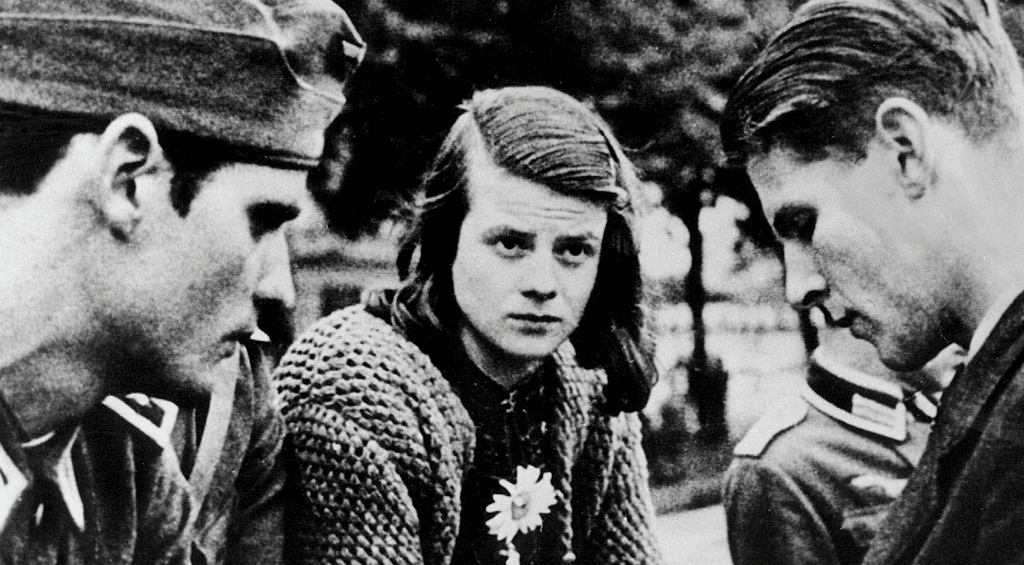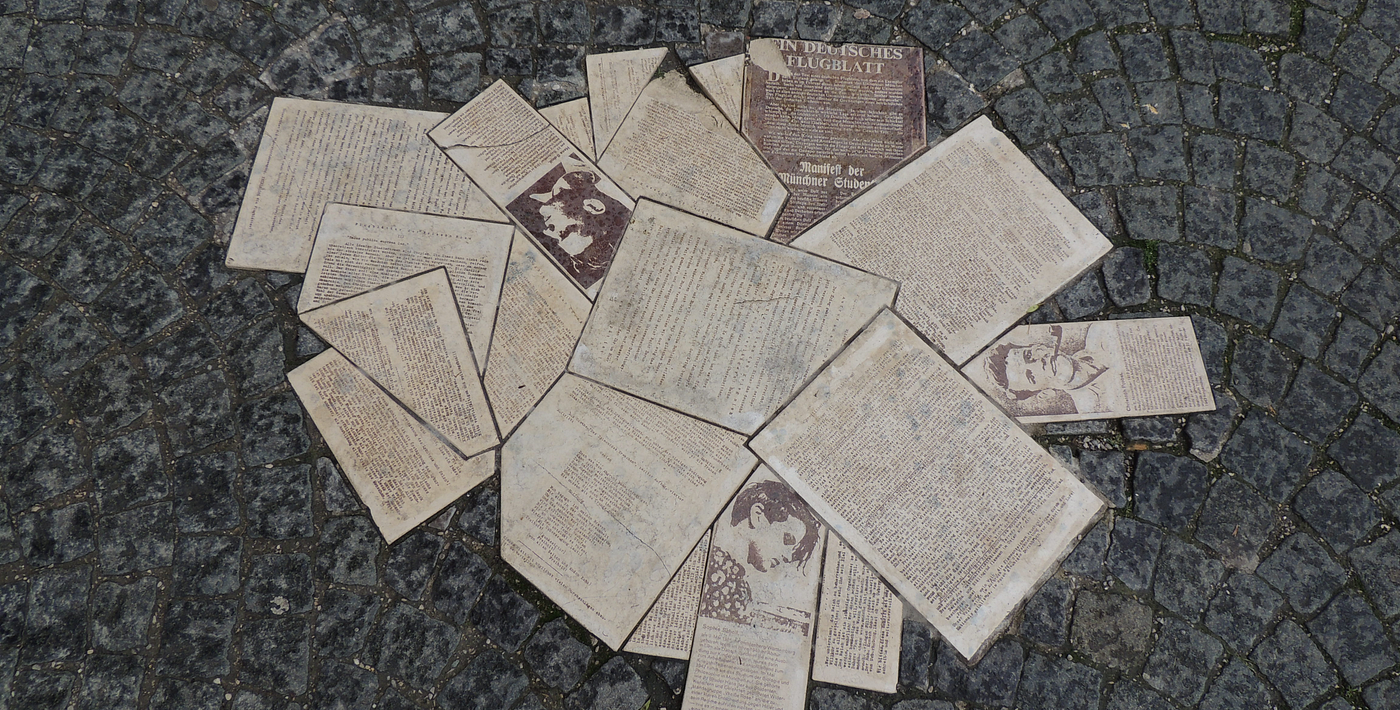Why Did Sophie Scholl Rish Her Life to Speak Out Agains Hitler
Sophie Scholl: The German language Educatee Who Led an Anti-Nazi Resistance Movement
"I'll make no bargain with the Nazis."

In 1942, anti-Nazi pamphlets titled "Flyers from the White Rose" began appearing overnight in public spaces effectually the Munich surface area. Thousands of leaflets distributed across Germany urged the German language people to resist the Nazi system, openly denouncing the Führer ("Every word that comes from Hitler'southward mouth is a lie!") and boldly warning the authorities: "We will non be silent. Nosotros are your bad conscience. The White Rose will not leave you in peace!"
The flyers attempted to encourage active opposition and dissent in a time when most German language citizens seemed conceited or resigned to Hitler's rule. Writing that "our nowadays country is the dictatorship of evil", one White Rose pamphlet asked:
Why exercise you let these men who are in power to rob you lot step by step, openly and in secret, of one domain of your rights after another, until one day nothing at all will exist left but a mechanized state arrangement presided over by criminals? Is your spirit already so crushed by abuse that y'all forget it is your right — or rather, your moral duty — to eliminate this system?
This peaceful White Rose resistance motility — named after a symbol intended to represent purity and innocence in the face up of evil — was founded, organized, and led by 5 German language young people, including 20-twelvemonth-old Munich University educatee Sophie Scholl.
As a teen, Sophie had initially joined the female fly of the Hitler Youth movement, the High german Girls League, and fifty-fifty became a Team Leader at the height of Hitler'south rise in 1935 — but it wasn't long before she began to question and rebel. When her Jewish friends (already forbidden to join the League with her) began to disappear, and after being reprimanded for reading passages from a banned book by the Jewish writer Heinrich Heine to a group of younger girls, Sophie wrote in her diary of the deep depression she felt under the 'nightmare' of Nazi rule. In 1939, she went for a walk with her older sister, who said, "Hopefully in that location volition be no state of war." Sophie replied, "I hope at that place will exist. Hopefully someone will stand to Hitler."
The outbreak of Globe War II came only a few months later, and Sophie's young man Fritz left to fight on the Eastern Front. His letters home, detailing state of war crimes carried out by German soldiers, were horrifying — and the more than Sophie learned of Nazi atrocities in the East, the more her disillusionment and despair hardened into determination. Afterward her father was arrested for speaking out against Hitler at his workplace, Sophie crept onto her university campus in the middle of the nighttime to write "liberty" on the wall. Shortly, an opportunity arose to channel her anger at the Nazi regime into organized, non-vehement resistance: together with her brother Hans, she joined the White Rose, purchased an illegal typewriter, and threw herself into the writing and guerilla distribution of the pamphlets.

Information technology was while scattering the group'due south sixth leaflet that Sophie and Hans were spotted by the campus janitor, who called the Gestapo on the Scholl siblings and held them until the secret police force arrived. Under interrogation, Sophie was offered a reduced sentence if she would admit that her blood brother had led her off-target. She refused, saying, "I won't betray my brother or my principles. I'll make no bargain with the Nazis."
Appearing in court with a cleaved leg, Sophie faced her hearing with typical unflinching backbone. "What nosotros wrote and said is too believed by many others," she proclaimed. "What does my expiry matter, if through us, thousands of people are awakened and stirred to action?"
The defendants were allowed no testimony, but Sophie's sole argument during her trial is a testament to her fearless resolve: "Time and time once more one hears it said that since nosotros have been put into a conflicting world, we have to adapt to it. Oddly, this completely un-Christian thought is most frequently espoused past and so-called Christians, of all people. How can we expect righteousness to prevail when in that location is hardly anyone who will give himself upwards to a righteous cause? I did the all-time that I could exercise for my nation. I therefore do not regret my conduct and will bear the consequences."
Alongside Hans and their boyfriend White Rose member Cristoph Probst, Sophie was bedevilled of high treason and sentenced to execution by guillotine. Her indictment read:
She admits to having taken office in the preparing and distributing of leaflets. Together with her blood brother she drafted the text of the seditious 'Leaflets of the Resistance in Germany'. In improver, she had a function in the purchasing of paper, envelopes and stencils, and together with her blood brother she actually prepared the duplicated copies of this leaflet. She put the prepared leaflets into various mailboxes, and she took part in the distribution of leaflets in Munich.
On the back of her copy of the indictment, Sophie wrote "freedom".

Before her beheading on Feb 22, 1943 —at the age of 21 years old — Sophie described a dream that she'd had the night earlier her trial. "It was a sunny day," she recounted. "I was carrying a kid, in a long white apparel, to be christened. The path to the church led up a steep gradient, but I held the child firmly. And then all of a sudden, a crevasse opened at my feet, gradually gaping wider and wider. I was able to put the child down safely earlier plunging into the abyss. The child is our idea. In spite of all obstacles, it will prevail."
Today, the legacy of the White Rose move lives on around the world as an enduring tribute to the moral courage of those willing to take a stand against any kind of tyranny, at any cost. Sophie and her boyfriend members of the White Rose resistance are remembered today as heroes in Germany — but the but surviving member, Franz Müller, says of his friends, "Hans and Sophie Scholl really did not want to exist heroes. Friendship and freedom were the values almost important to them."
After the war — subsequently the full extent of the Nazi atrocities became articulate to all — Hitler's personal secretary, Traudl Junge, recalled, "I was satisfied that I wasn't personally to arraign and that I hadn't known about those things. I wasn't aware of the extent. Simply one day I went past the memorial plaque which had been put upward for Sophie Scholl, and I saw that she was built-in the same year as me, and she was executed the same twelvemonth I started working for Hitler. And at that moment I actually sensed that information technology was no excuse to exist young."
As we look to history for lessons and inspiration, it is worth remembering the bravery of gratis-thinking, freedom-loving Sophie, and her refusal to look away or be silent.
You tin read the White Rose leaflets translated into English hither .
maxwellhillowitich.blogspot.com
Source: https://amysmartgirls.com/sophie-scholl-the-german-student-who-led-an-anti-nazi-resistance-movement-ef4c8d2f4d96
0 Response to "Why Did Sophie Scholl Rish Her Life to Speak Out Agains Hitler"
Post a Comment